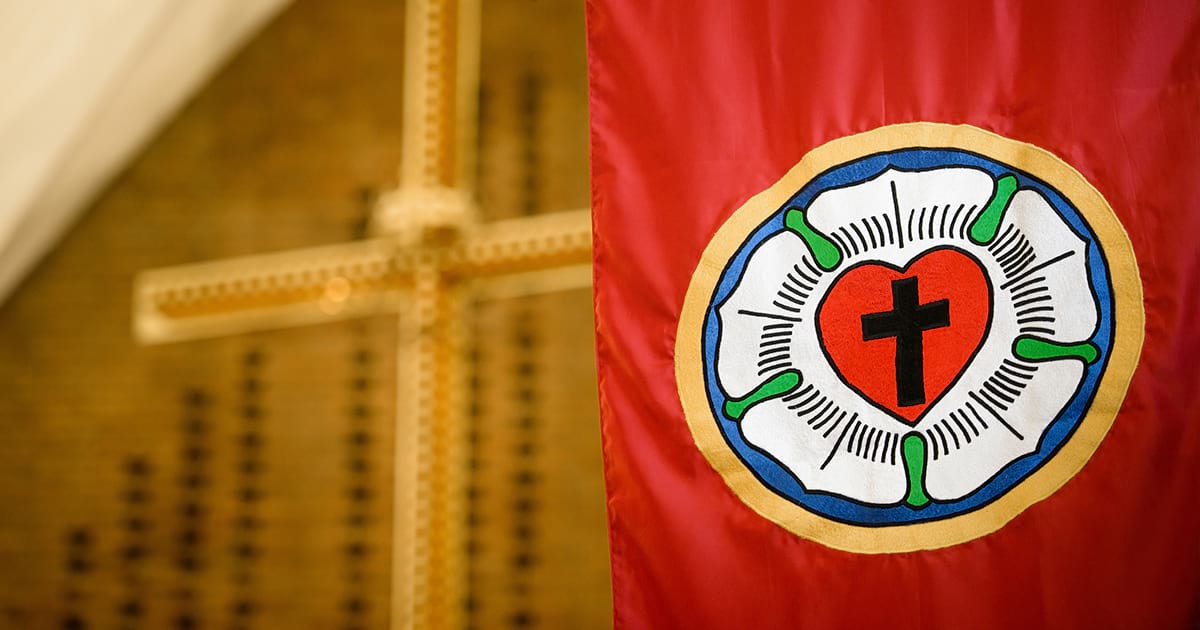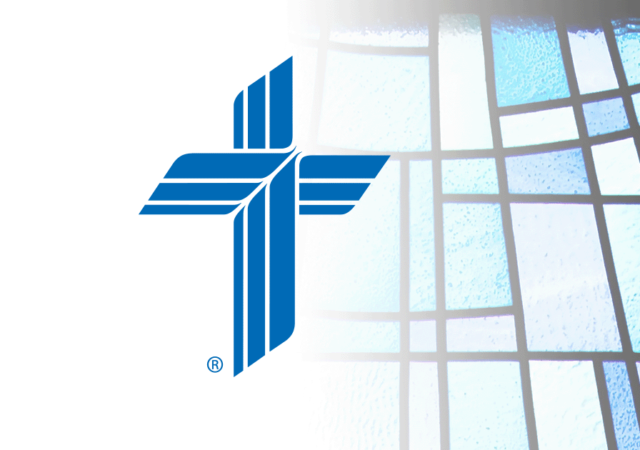
By Matthew C. Harrison
The following article is excerpted from the President’s Report, Part 3, delivered on July 30 at the 2023 LCMS convention in Milwaukee.
“Hier stehe Ich. Ich kann nicht anders.”
“Here I stand. I cannot do otherwise,” responded Luther in 1521 when the greatest authority of his political and religious world tried to force him to recant of his teaching. This response has become so famous that we joke about it. We make “Here I stand” socks. Some even use it for self-deprecating humor, suggesting that we say, “Here we stand,” instead of “Here we go.” But we cannot stand on the Gospel without going with the Gospel.
The Diet of Worms continues to have great significance for the church. Luther had been told that the emperor wanted to hear one word and one word only from this troublesome German monk — “Revoco,” [which means] “I recant.” Luther stood by a pile of his books and was questioned. “Are these yours?” “Do you recant?” Luther asked for time to think about the matter overnight. When he was brought to the same hall, he spoke the words we all remember:
“Unless I am convinced by proof from Holy Scripture, or by cogent reasons … I neither can nor will retract anything; for it cannot be either safe or honest for a Christian to speak against his conscience. Here I stand. I cannot do otherwise. God help me. Amen.”
Luther has been blamed for most every western philosophical, political or religious movement since. But he’s no advocate of the rejection of the Bible for “reason,” or radical individuality. His reason and conscience were captive to the Word of God. And because “the word of the Lord remains forever” (1 Peter 1:25), this Word and faith is confessed before the judgment seat of God.
The Formula of Concord quotes Luther’s great 1544 confession, made when Melanchthon and others in Wittenberg were wobbling on the true presence of Christ in the Sacrament:
“I am not drunk or irresponsible. I know what I’m saying, and I well realize what this will mean for me before the Last Judgement at the coming of the Lord Christ. Let no one make this out to be a joke or idle talk; I am in dead earnest, since by the grace of God I have learned to know a great deal about Satan.” (Formula of Concord, Solid Declaration VII.3031)
The confessors of our Book of Concord have the same spirit. And we have made it our own:
“This Confession also, by the help of God, we will retain to our last breath, when we shall go forth from this life to the heavenly fatherland, to appear with joyful and undaunted mind and with a pure conscience before the tribunal of our Lord Jesus Christ.” (Preface to the Book of Concord 16)
Jesus asked His disciples, “Who do you say that I am?” Peter responded for them all, “You are the Christ, the Son of the living God” (Matt. 16:16). Christ asks this question to each of us. For most of us, our confession began when we were infants. Our sponsors and the congregation confessed the faith that we were given in Baptism. In confirmation we confessed before God and man that we will never forsake the Christian faith as confessed in Luther’s Small Catechism. In ordination we stand before God and man and confess that we shall die before forsaking this Christian and Lutheran faith. As Christians in this world, we must stand and profess. “You are the Christ.” “Here I stand. I can do no other.”
Every pastor, teacher, deaconess, church musician, elder, congregational officer, Sunday school teacher, individual congregation, new member, district, district president, parochial school, Concordia (named for this confession!) has, does and continues to confess before God and at His judgment seat on the last day: “You are the Christ, the Son of the living God” (Matt. 16:16). “I make this biblical/Lutheran confession my own.” We all individually, and together with this whole convention are bound to Article II of the Synod’s Constitution:
The Synod, and every member of the Synod, accepts without reservation:
- The Scriptures of the Old and the New Testament as the written Word of God and the only rule and norm of faith and of practice;
- All the Symbolical Books of the Evangelical Lutheran Church as a true and unadulterated statement and exposition of the Word of God, to wit: the three Ecumenical Creeds (the Apostles’ Creed, the Nicene Creed, the Athanasian Creed), the Unaltered Augsburg Confession, the Apology of the Augsburg Confession, the Smalcald Articles, the Large Catechism of Luther, the Small Catechism of Luther, and the Formula of Concord.
The necessity of both confession and action form the first two of the objectives of the Synod:
- Conserve and promote the unity of the true faith (Eph. 4:3–6; 1 Cor. 1:10), work through its official structure toward fellowship with other Christian church bodies, and provide a united defense against schism, sectarianism (Rom. 16:17), and heresy.
Here I stand!
And then the second objective defines the apostolic compulsion of Christianity (1 Cor. 9:16). The Synod exists to:
- Strengthen congregations and their members in giving bold witness by word and deed to the love and work of God, the Father, Son, and Holy Spirit, and extend that Gospel witness into all the world.
Here we go!
‘Bold witness’
This “bold witness” was a conscience issue for St. Paul and the other apostles. Paul put it this way: “For if I preach the gospel, that gives me no ground for boasting. For necessity is laid upon me. Woe to me if I do not preach the gospel!” (1 Cor. 9:16). Paul was created to preach the Gospel, prepared to preach the Gospel, called to preach the Gospel, sent to preach the Gospel, lived to preach the Gospel, died preaching the Gospel!
In Acts 4 we read that Peter and John got in trouble for healing a disabled man, that is, for “giving bold witness by word and deed to the love and work of God.”
So they called them and charged them not to speak or teach at all in the name of Jesus. But Peter and John answered them, “Whether it is right in the sight of God to listen to you rather than to God, you must judge, for we cannot but speak of what we have seen and heard.” (Acts 4:18–20)
And here’s what they spoke:
“And when they had set them in the midst, they inquired, ‘By what power or by what name did you do this?’ Then Peter, filled with the Holy Spirit, said to them, ‘Rulers of the people and elders, if we are being examined today concerning a good deed done to a crippled man, by what means this man has been healed, let it be known to all of you and to all the people of Israel that by the name of Jesus Christ of Nazareth, whom you crucified, whom God raised from the dead — by him this man is standing before you well. This Jesus is the stone that was rejected by you, the builders, which has become the cornerstone. And there is salvation in no one else, for there is no other name under heaven given among men by which we must be saved.’” (Acts 4:7–12)
In Acts 5 the apostles are called before the officials yet again:
“’We strictly charged you not to teach in this name, yet here you have filled Jerusalem with your teaching, and you intend to bring this man’s blood upon us.’ But Peter and the apostles answered, ‘We must obey God rather than men.’” (Acts 5:28–29)
Now notice how this compulsion to preach Jesus, the burden of the apostolic conscience, is the compulsion to preach the clear, specific Gospel.
“The God of our fathers raised Jesus, whom you killed by hanging him on a tree. God exalted him at his right hand as Leader and Savior, to give repentance to Israel and forgiveness of sins. And we are witnesses to these things, and so is the Holy Spirit, whom God has given to those who obey him.” (Acts 5:30–32)
The Synod’s Constitution says our objective is to “strengthen congregations and their members in giving bold witness by word and deed to the love and work of God, the Father, Son, and Holy Spirit, and extend that Gospel witness into all the world.” This is as biblical and clear as the Word and work of Jesus, and the word and works of His apostles in Acts 4 and 5. …
My job as chair of this convention is to see that you get the business done you want done. The goal is that you, the duly elected representatives of your congregations, deliberate and act as you see fit in accordance with our governing documents. …
We have a beautiful confession, a courageous confession. We have the clarity and certainty of Jesus’ forgiveness in His Word and Sacraments. We have the answer the world needs to all its ills.
And now we have the privilege of letting that confession guide and govern our work together these next few days. …
We face tremendous challenges to be true. But you will be hearing of blessings aplenty. Here we stand! And here we go!
Posted Oct. 13, 2023




Amen Lord Jesus! May it be so!